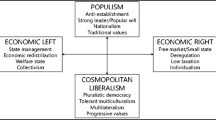Conclusion
Finally, one must add that not all political cycles are caused by economic factors, and vice versa. The important point is the explicit recognition of their mutual interdependence.
Similar content being viewed by others
References
Åkerman, J. “Political Economic Cycles,”Kyklos. 1, (fasc. 2, 1947), 107–117.
Arrow, K. J.Social Choice and Individual Values. New York: John Wiley & Sons, 1951.
Bean, L. H.Ballot Behavior. Washington, D.C.: American Council on Public Affairs, 1940.
——.How to Predict Elections. New York: Alfred A. Knopf, Inc., 1948.
Berelson, B., Lazarsfeld, P., and McPhee, W.Voting. Chicago: University of Chicago Press, 1954.
Butler, D. E.The British General Election of 1955. London: MacMillan & Co., Ltd., 1956.
—— and Rose, R.The British General Election of 1959. London: MacMillan & Co., Ltd., 1960.
—— and King, A.The British General Election of 1964. London: MacMillian & Co., Ltd., 1965.
Campbell, A., Converse, P., Miller, W. and Stokes, D.The American Voter. New York: John Wiley & Sons, 1960.
——.Elections and the Political Order, Part I: The Flow of Votes. New York: John Wiley & Sons, 1966.
Downs, A.An Economic Theory of Democracy. New York: Harper and Row Publishers, 1957.
Frey, B. and Lau, L. J. “Towards a Mathematical Model of Government Behavior,”Zeitschrift fűr Nationalőkonomie. 28 (Nov. 1968), 355–380.
Hotelling, H. “Stability in Competition,”Econ. Jour. 39, 153 (March 1929), 41–57.
Kaltefleiter, W.Wirtschaft und Politik im Deutschland. Konjunkturals Bestimmungsfaktor des Parteiensystems. Koln: Westdeutscher Verlag, 1966.
Key, V. O., Jr.Politics, Parties and Pressure Groups, 5th ed. New York: Thomas Y. Crowell Co., 1964.
——.The Responsible Electorate. Cambridge: Belknap Press of Harvard Univ., 1966.
Kramer, G. H. “A Decision-Theoretic Analysis of a Problem in Political Campaigning,” in J. L. Bernd,Mathematical Applications in Political Science. Dallas: Southern Methodist Univ. Press, 1966, 137–160.
——--. “Short-Term Fluctuations in U.S. Voting Behavior, 1896–1964,” paper presented at the Seventh World Congress of the International Political Science Association, Brussels, Sept. 1967.
Manne, A. S. “Programming of Economic Lot Sizes,”Management Science 4, No. 2 (Jan. 1958), 115–135.
——, ed.Investments for Capacity Expansion: Plant Size, Location and Time-Phasing. Cambridge: M.I.T. Press, 1968.
Mueller, E. “Public Attitudes Towards Fiscal Programs,”Quart. Jour. Econ. 77, No. 2 (May 1963), 210–235.
Pontryagin, L. S., Boltyanskii, V. G., Gamkredlidze, R. V. and Mischenko, E. F.The Mathematical Theory of Optimal Processes. New York: Interscience Publishers, 1962.
Riker, W. H.The Theory of Political Coalitions. New Haven: Yale Univ. Press. 1962.
Rothenberg, J. “A Model of Economic and Political Decision-Making,” in J. Margolis, ed.,The Public Economy of Urban Communities. Washington, D.C.: Resources for the Future, Inc., 1965.
Schumpeter, J. “The Analysis of Economic Change,”Rev. Econ. Stat. 17, No. 4 (May 1935), 2–10.
——Capitalism, Socialism and Democracy. New York: Harper and Brothers Pub., 1942.
Theil, H.Economic Forecasts and Policy. Amsterdam: North Holland Pub. Co., 1961.
Tinbergen, J.Economic Policy: Principles and Design. Amsterdam: North Holland Pub. Co., 1956.
Additional information
The authors are, respectively, assistant professor of economics, Stanford University and lecturer in political economy, University of Basel. This is a revised version of a paper presented at the Winter Meeting of the Econometric Society, Evanston, Illinois, December 27–30, 1968. An early draft of this paper has benefitted from the helpful advice of Professors K. J. Arrow, D. Black, A. F. Burns, M. Kurz and A. S. Manne. Financial assistance from the Institute of International Studies, University of California, Berkeley, for part of the research is gratefully acknowledged. Remaining errors are the responsibility of the authors.
Rights and permissions
About this article
Cite this article
Lau, L.J., Frey, B. Ideology, public approval, and government behavior. Public Choice 10, 21–40 (1971). https://doi.org/10.1007/BF01718620
Issue Date:
DOI: https://doi.org/10.1007/BF01718620



